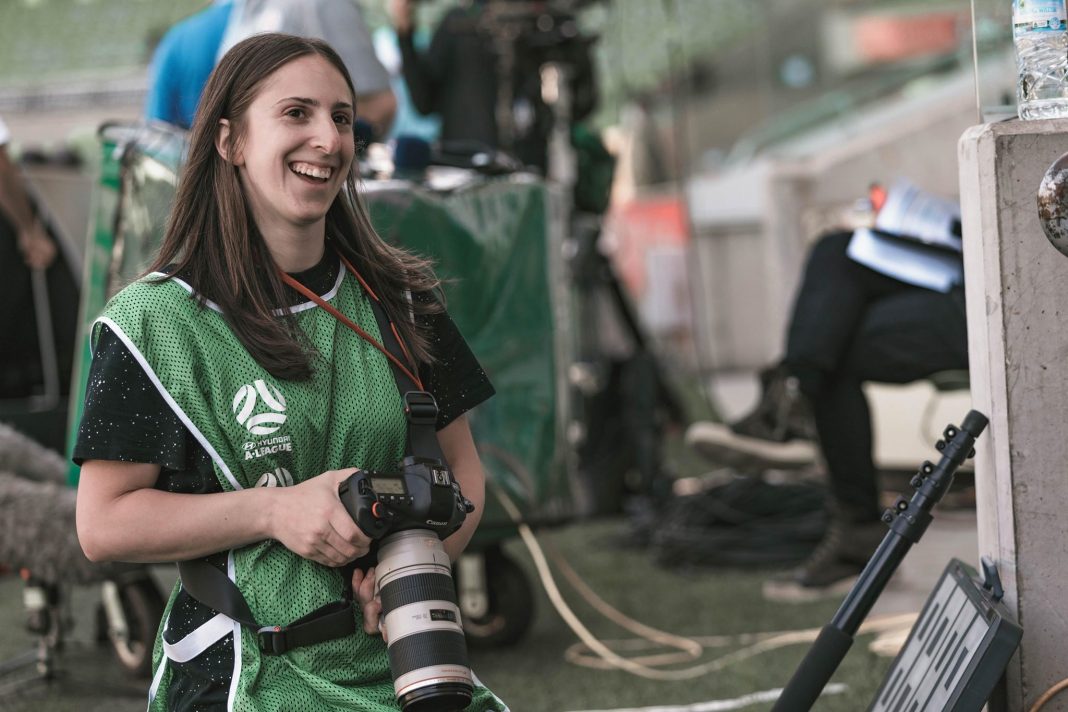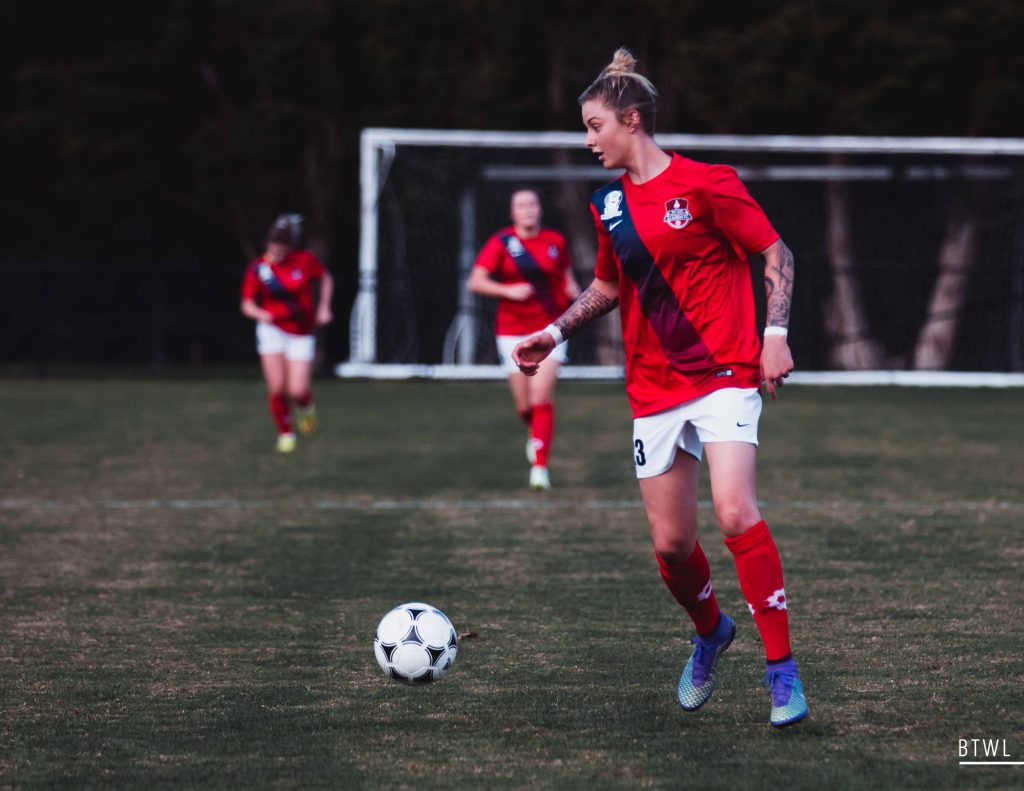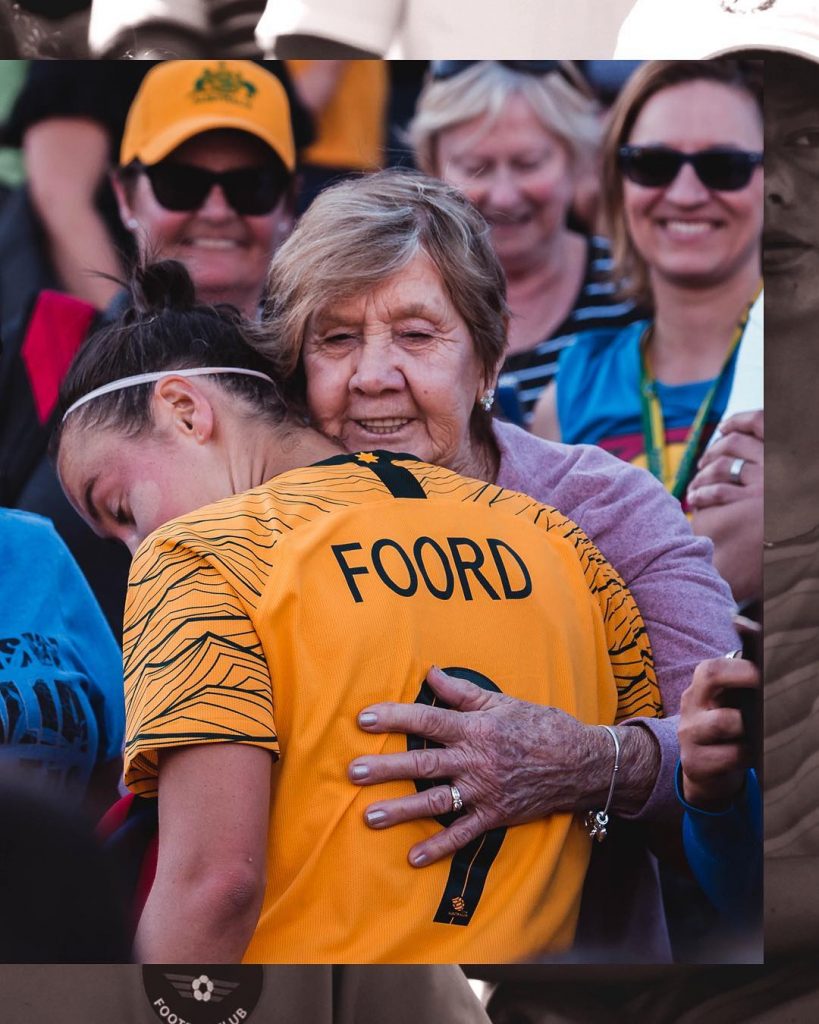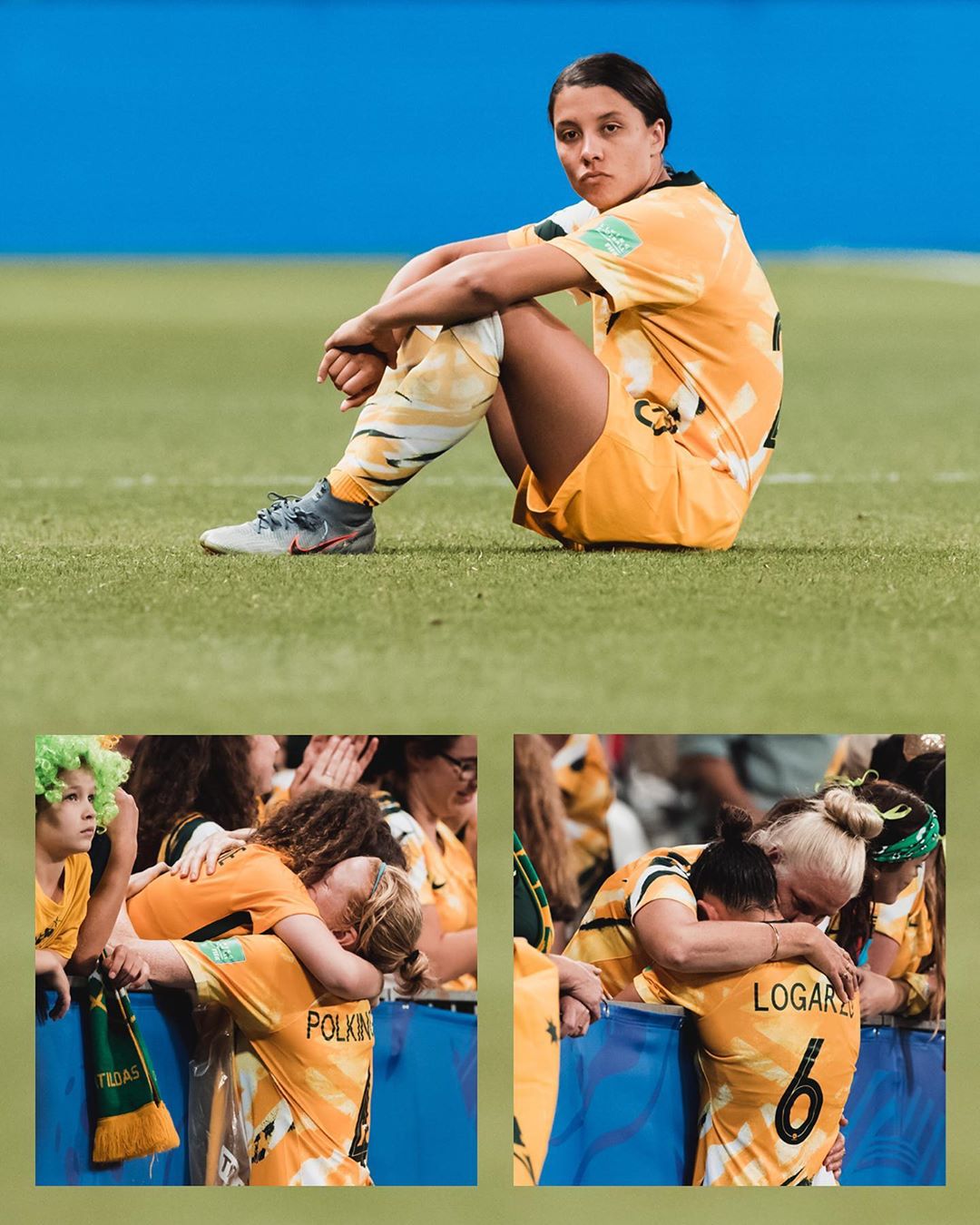

Over the last couple of years, By The White Line (BTWL) has become a familiar name within women’s football. Started by Rachel Bach, her brand has become synonymous with capturing uniquely moving and privileged moments, where the bond between photographer and subject is undeniably evident.
It may come as a surprise to some as they scroll through a plethora of incredible images on BTWL’s Instagram, but Rachel’s journey as a photographer started not too long ago.
“I always played football and, in 2011, I suffered an ankle injury which meant I couldn’t play for the 2012 season,” she said.
“So, while I wasn’t playing, I’d just muck around on my friend’s cameras. I was always intrigued by photography, but at that stage I’d never consciously thought it was something I wanted to do.”
https://www.instagram.com/p/BPLZEyxAhuc/
Studying her Masters in Multimedia Design, it was a given that she would end up doing something creative, but it wasn’t until a few years later that her intrigue turned into something more tangible.
“When I was travelling in Europe, a friend of mine mentioned there was a multimedia job going at Football Victoria and she thought I should apply for it,” Rachel said.
But she doubted she had what it took.
“I did that classic thing that women do – I doubted myself.”
“I didn’t think I had the skills for the job and I didn’t know how I was going to make it work with uni, but somehow my friend convinced me to apply for it.”
Instead of spending her time sightseeing, Rachel created a portfolio and CV which she sent to Football Victoria’s Teo Pellizzeri. She didn’t know at the time, but Teo would become one of the most instrumental people in getting her football photography career off the ground.
“I’d never met Teo at that stage, but I knew of his commentary and of his work. He responded very quickly wanting to shortlist me and have a chat,” Rachel said.
“He said, given my full-time commitments at uni, it would be hard to take on the role, but if I was interested in doing any video or photography on a casual basis, to let him know.”
Rachel shot her first women’s NPL game in May 2016.
“I’d been watching NPL for years – and the first game I shot was Box Hill vs Alamein. On the morning of the game, Alamein announced a new signing, Larissa Crummer, which was really exciting but I was very nervous,” she explained.

“When I got to the ground, I walked in through the car park – rather than going to the grandstand – and onto the ground. I went around to the far side and shot the game from behind the fence.”
“I was too scared to be on the pitch, because I felt like the biggest imposter.”
“I felt like I didn’t know what I was doing, so I stood there with my monopod and a friend beside me because I needed the moral support. I did eventually walk inside the fence at some point during the game, but I will never forget how nerve-racking and intimidating those moments were early on.”
The newly-fledged sports photographer then captured her first Matildas game four weeks later and, since then, has found her feet and her voice.
Along with shooting the NPL, W-League, and the Matildas, Rachel has recently been picked up by Nike to travel the globe working with the likes of Sam Kerr, Ellie Carpenter, Caitlin Foord, and Kyah Simon, but her ‘why’ has remained the same throughout.
“Initially, I was looking for a way to stay involved in football and give back to something that has given so much to me – photography was that,” she explained.
“For me, it was this amazing experience, but I also felt like I was doing something important. Mainly, it was important to me. I didn’t know if it was important to anyone else, I didn’t wonder what the purpose was or how these images would effect people, but that came in time.
“Now I’m at the point where, regardless of the photo, there needs to be a story. I try to show more than what you can see as a fan, either in the stands or on TV. I might see something small that happens on the pitch and something goes off in my mind that gets me thinking, ‘this is important, and this is why this is important’.
“Sometimes it doesn’t even involve the game – in fact, often it doesn’t involve the game at all,” Rachel explained.
“I don’t post a lot of action photos and I don’t focus on performance – occasionally there are some amazing athletic moments, but the majority of what I want to showcase are the moments off the pitch, of the emotion, the celebration.”


Capturing emotion is a difficult task for any photographer, but one that this photographic phenom has great success in doing. She puts it all down to building trust and investing in relationships.
“Trust is the most important aspect of what I do, and I work really hard to build relationships. Not in the sense that I’ve pushed anything, but I think once I realised that my work mattered and that people appreciate what I do, there came a responsibility with that too.
For Rachel, a strong relationship is more important than getting the perfect shot.
“If I take a frame and it’s the most amazing display of athleticism – you get someone flying through the air, full-throttle, if they are pulling a weird face in that photo, no one will ever see it, I don’t care how good the photo is,” she said.
“It’s very much about keeping that trust. Some people might say, that’s silly – you’re getting rid of a good frame – but for me the relationships are more important and if you know anything about the players you’re shooting, you’ll know what sort of shots they appreciate.
“Having that trust enables me to tell stories in a way that other people can’t necessarily.”
One example of Rachel being privy to a story that others were not, came about during the 2019 FIFA Women’s World Cup (FIFA WWC) when the Matildas played against Jamaica.
“After the game, where Sam scored four goals against Jamaica, she came over to me specifically to ask for a photo with the ball. It’s one of those moments that I wrote about on Instagram,” she said.
“Even though I’d been working with Sam this year, I still didn’t believe or think she was coming over to me to ask for a photo. I thought to myself, ‘Why is she coming over here holding the ball, maybe it’s for one of the kids in the crowd?’ but she was coming over to me for a photo.
“To know that she’s comfortable enough to do that and to know I’ve got that bond with her where I can say ‘Just wait a second, let me check that the photos are good,’ – you just don’t get the chance to do that as a photographer, there are no re-dos, but I think that’s testament to the relationship.”
And that bond is just as important to players, with Matildas defender Stephanie Catley explaining why the trust comes so easily with Rachel.
“In the wide world of social media and photography, it’s pretty rare to find someone who cares so much about the person they’re taking a photo, or posting a photo of,” Catley said.
“Rachel takes the time to observe, listen and learn about the people she’s photographing which makes her photos so much more raw and powerful.”
“It also means that she gets the most natural photos of us behind the scenes because we are able to be our true, over-the-top, dorky selves around her.
“There’s a high level of trust letting someone into your bubble like that but Rach makes it very easy. She captures people and their stories, their passion, pride, heart break and ecstacy in a way I’ve never seen before.
“Women’s football relies on people like Rachel. Back when not many people paid attention to female footballers, she was there, doing it anyway, and allowing us to use her photos to help boost our own profiles. It’s people like her who remind us of how beautiful the game of football really is, and how it brings so much happiness to so many people.”
“She has found a way to capture us in a way that we’ve never been captured before, in a way that she already viewed us – as elite athletes but with unique and important stories”
Matildas teammate Kyah Simon echoed Catley’s sentiments.
“Without people like Rachel, the game wouldn’t develop and grow as much as it has. Having that passion about all facets of football will continue to grow the game and reach corners of the globe that maybe we, as players, are unable to,” Simon said.
“She just gets it, her passion for photography and specifically women’s football – capturing the moment and showing the emotion to her edits, captions and photos she chooses out of the million she takes per game… she is selfless in her work and by that I mean she will always be mindful of what photos we as players would like best.”
“The way they have embraced me has been pretty special,” Rachel said of the Matildas.
“There’s an element to what I do, that’s just for me – but that’s a very small part. The rest of it is just because someone needs to be telling these stories and telling them in the way they should be told, because the impact these athletes are having on people all around the world is extraordinary.”
“One of the things that stands out to me is a message I received from one of the players saying, ‘You’re the only one that can capture us, as us,’ and I think people might not realise that this is what this team wants. They want to be showcased as themselves.”
“It’s very easy for sportspeople to shy away from showing their personal side, but the Matildas don’t. They have such unique personalities. For example, during the World Cup pre-camp in Turkey, my favourite part of shooting was when they’d walk out onto the pitch.
“All the different personalities would come out and it would change every day. One day I’d have Sam walking towards me, looking very serious, and then she’d break out into a dance move before she keeps going; some will just smile, others will say hello, and that changed throughout the time I was there.
“I don’t know all the players on a personal level, but you’ve got to show that what you’re doing, you’re doing for the right reasons, so my motivation is to do just that and tell those stories along with feeling like what I’m doing is making a difference.”
On the flip side of the coin, having that relationship also equals a higher emotional investment, which can sometimes be difficult to balance. Rachel experienced that this month at the FIFA WWC when the Matildas made an untimely exit from the competition.
“Watching the Matildas get knocked out in the Round of 16 was probably the hardest moment of my career so far.”
“It’s just one of those things where you’ve got to balance your emotions.
“After the penalties, I could see the players, their families and I just sat next to the signage board as far away as I could. I thought to myself, even though I know the players will want these memories, because it’s going to motivate them – I also thought it was nice to just sit half a pitch away and take it all in and give them their space because they don’t get a lot of that,” she continued.


“I felt the same way last year in Jordan at the Asian Cup final. Seeing their devastation was very hard. I felt very conflicted about it, and I always do feel conflicted about posting and publicising their pain, but they’re all important parts of the journey and I know what’s acceptable and what’s not.
“Even shooting the W-League grand final, after working so closely with Caitlin and Sam was hard. They were playing against each other and I knew either way one of them was going to come out on the raw end of it.”
Like many women in sport, the majority of Rachel’s work is voluntary. She self-funded her five-week trip to the FIFA WWC and has spent thousands on flights and accommodation over the past couple of years, to capture and share the sport she loves.
“I just needed to be there [at the FIFA WWC], because it is so important to me – I felt a deep obligation to cover it. I knew if I didn’t, I would regret it so much.”
The battle for investment in women’s sport is an uphill trudge, both for the sport itself and those passionate about giving it the coverage it deserves.
“It’s such a struggle to get suitable investment in women’s sport, let alone in the media and volunteers that cover them.
“I think a prime example is that during this years’ FIFA WWC Final, they were also showing two men’s finals and that speaks volumes.
“We’ve got such a long way to go in terms of treating mostly players, but even media and volunteers professionally, and investing in them the way we should. We need some big changes and I’d like to know what I can do to help expedite that process.”
But in what women’s sport lacks in investment, it does make up for in community and connection.
https://www.instagram.com/p/BVa915nFRKk/
“The people I know who are involved in women’s football are just as passionate as I am, so working or volunteering with people like that – even though we’re not getting paid, is so rewarding.”
“It’s such a tight-knit community and it’s so supportive. I shot my first Matildas game a month after I shot my first NPL game, and that just doesn’t happen. It was all due to Teo saying, ‘would you like an opportunity – I can get you accredited?’
“I credit Teo as much as I can because he has just been so instrumental in my journey, he was the one who gave me my start and I will always be grateful to him for that.
“Then there’s people like Ann Odong, who is amazing. She is the queen of women’s football and there is no way I would be where I am without her.
“She is doing incredible things and she absolutely deserves it. We are very supportive of each other and tell each other how proud we are of each other all the time, and I don’t think people do that enough.
“We talk a lot about women supporting women and how important that is, but actually practicing it makes you realise how important it truly is.”
One of Rachel’s biggest self-discoveries has been that in wanting to fill a need in women’s football coverage, her photography also fulfils an important need within herself.
“I would say what has surprised me is how much I need photography.”
“Photography is such an emotional release for me and by doing it, I feel like I’ve found my place.”
“This is exactly where I want to be and the challenge now is to continue that. I’m not interested in using women’s football as a stepping stone – for me, women’s football is the peak and I’ve realised that maybe I need it, just as much as it needs me.”






